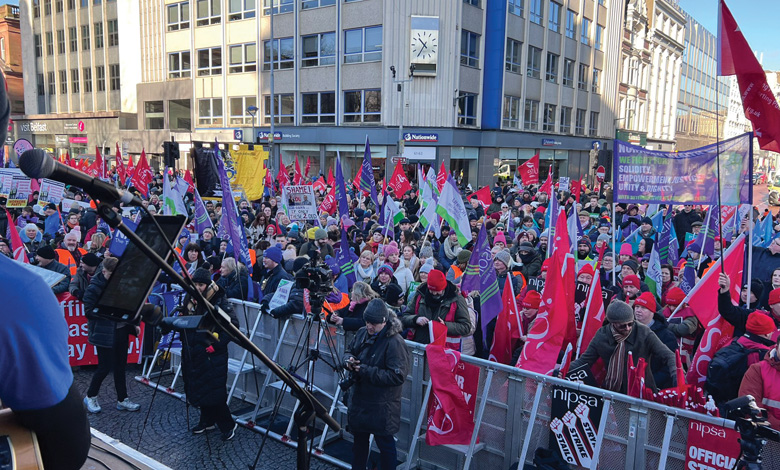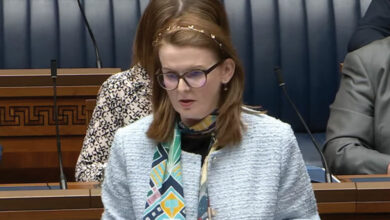Heaton-Harris tables ‘final’ financial package to incentivise Executive return

Secretary of State Chris Heaton-Harris MP has tabled a ‘take it or leave it’ financial package, aimed at enticing the return of the Executive, that now amounts to £3.3 billion. With a new budget for Northern Ireland due soon, Heaton-Harris has said the package will not be available without the return of the institutions.
Heaton-Harris’s ‘final’ offer of a financial package contingent upon the return of the Stormont Executive amounts to £3.3 billion in funding, an increase on the £2.5 billion that had been offered the week before the tabling of the final offer in mid-December 2023. Stressing that the package on offer was ‘generous’, Heaton-Harris called for the DUP to return to Stormont, stating it is “now time for decisions”.
Presenting the financial package to the media, Heaton-Harris broke down highlights of the £3.3 billion, including: almost £600 million for public sector pay awards for 2023; £34 million to aid in the tackling of healthcare waiting lists in 2024; £15 million to aid with the initial costs related to the PSNI data breach in 2023; the creation of an investment zone for Northern Ireland that will be worth £150 million according to the UK Government; and the improvement of the terms of a potential stabilisation fund meaning an extra £520 million over two years, bringing the total to £1.125 billion.
Public sector pay
The £600 million intended to fund public sector pay claims will go some way towards addressing one of the most pressing challenges that would face any resurrected Stormont, with an estimate 170,000 public sector workers having called a mass strike on 18 January to protest real terms pay cuts they have endured while the Executive has been dormant, meaning they have seen no real terms pay increases during an inflationary crisis. The Northern Ireland Statistics and Research Agency’s Annual Survey of Hours and Earnings found that the typical public sector worker in Northern Ireland saw the real value of their wages fall by 4 per cent between April 2021 and April 2022 and by a further 7 per cent from April 2022 to April 2023.
Unions representing the striking public sector workers had called on Heaton-Harris to release the £600 million regardless of the return of the political institutions. Irish Congress of Trade Unions assistant general secretary Liam Murphy stated that Heaton-Harris “remains unwilling to pay public servants a fair increase or even speak to the trade union leadership”, but that he had “conceded” the “moral case for fair pay” by offering the £600 million and accepting that the workers were in need of a pay increase. He added that the attempt to ‘withhold’ the funding pending the return of Stormont was “an ill-judged and cynical attempt to manipulate these workers”.

With the Northern Ireland Civil Service stating that there is no funding for the pay increase without the £600 million, Head of the Civil Service Jayne Brady wrote to Heaton-Harris urging him to release the £600 million to avoid the strike action on 18 January, but the Northern Ireland Office’s position is that the Secretary of State has no authority to negotiate public sector pay.
Stormont overspend
After two years of Stormont overspend, the total sum that a returning Executive would owe to the UK Treasury now stands at £560 million. However, Heaton-Harris has offered to freeze any repayments for two years and to then write off the sum if the resurrected Executive produces a fiscal sustainability plan.
Public funding
Through the £3.3 billion package, £1.125 billion would be made available in “stabilisation funding” aimed at repairing the damage done to public services that have seen funding stagnate. There will also be additional funds of £34 million and £15 million made available to tackle hospital waiting lists and the costs of the PSNI data breach respectively.
Further flexibility would also be introduced into Stormont finances, with the amount an Executive could borrow for infrastructure projects to be increased over five years, the ceiling eventually rising by £135 million. £600 million of funding previously given for central government funding would also be allowed to be reallocated under the terms of the package.
A new fiscal floor would also be introduced, meaning that spending per head in Northern Ireland would always be 24 per cent higher than it is in England in order to better reflect the higher costs of delivering equivalent public services in Northern Ireland. This fiscal floor would operate in a manner similar to that of Wales, where the normal allocation of funds is topped up to ensure funding never falls below a certain threshold.
‘Time for decisions’
While this financial package has been widely publicised as a £3.3 billion package, it should not be taken that that means the Westminster government would provide £3.3 billion in new funding should the Executive return: over £1 billion of that £3.3 billion would be accounted for by the forgiveness of £560 million of Stormont overspend and the allowance for the reallocation of £600 million of previously allocated funding.
Despite this, it does represent an effort on the part of Westminster to heavily incentivise the DUP to return to the institutions with badly needed funding that any returning Executive would need to address multiple funding holes in public finances. With this funding only available to a resurrected Executive and a new budget for Northern Ireland due in the coming months to follow on from 2023’s ‘punishment budget’, the ball is in the court of the DUP; it is, as Heaton-Harris said, time for decisions.





